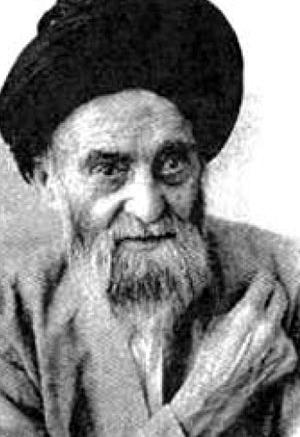Reza Zanjani on:
[Wikipedia]
[Google]
[Amazon]
Ayatollah Seyed Reza Zanjani (born 1902 in Zanjan, died 4 January 1984) was a Shia Iranian cleric who opposed first the autocracy of Shah  Reza Zanjani was an
Reza Zanjani was an
Mohammad Reza Pahlavi
, title = Shahanshah Aryamehr Bozorg Arteshtaran
, image = File:Shah_fullsize.jpg
, caption = Shah in 1973
, succession = Shah of Iran
, reign = 16 September 1941 – 11 February 1979
, coronation = 26 October ...
and then theocracy
Theocracy is a form of government in which one or more deity, deities are recognized as supreme ruling authorities, giving divine guidance to human intermediaries who manage the government's daily affairs.
Etymology
The word theocracy origina ...
that was established by Ayatollah Ruhollah Khomeini
Ruhollah Khomeini, Ayatollah Khomeini, Imam Khomeini ( , ; ; 17 May 1900 – 3 June 1989) was an Iranian political and religious leader who served as the first supreme leader of Iran from 1979 until his death in 1989. He was the founder of ...
and his supporters following the Islamic Revolution
The Iranian Revolution ( fa, انقلاب ایران, Enqelâb-e Irân, ), also known as the Islamic Revolution ( fa, انقلاب اسلامی, Enqelâb-e Eslâmī), was a series of events that culminated in the overthrow of the Pahlavi dyna ...
.
 Reza Zanjani was an
Reza Zanjani was an Azeri
Azerbaijanis (; az, Azərbaycanlılar, ), Azeris ( az, Azərilər, ), or Azerbaijani Turks ( az, Azərbaycan Türkləri, ) are a Turkic peoples, Turkic people living mainly in Azerbaijan (Iran), northwestern Iran and the Azerbaijan, Republi ...
from Zanjan Province in Northwest Iran. He was active in politics, supporting Prime Minister Mohammed Mosaddeq
Mohammad Mosaddegh ( fa, محمد مصدق, ; 16 June 1882 – 5 March 1967) was an Iranian politician, author, and lawyer who served as the 35th Prime Minister of Iran from 1951 to 1953, after appointment by the 1950 Iranian legislative election ...
, and following Mossaddeq's overthrow in the 1953 coup invited nationalist and religious opposition groups to join the National Resistance Movement. In the years before the 1979 Islamic Revolution
The Iranian Revolution ( fa, انقلاب ایران, Enqelâb-e Irân, ), also known as the Islamic Revolution ( fa, انقلاب اسلامی, Enqelâb-e Eslâmī), was a series of events that culminated in the overthrow of the Pahlavi dyna ...
he is said to have "retained close contacts with the secular National Front as well as the religious-minded Freedom Movement of Iran
The Freedom Movement of Iran (FMI) or Liberation Movement of Iran (LMI; fa, نهضت آزادی ايران, Nahżat-e āzādi-e Irān) is an Iranian pro-democracy political organization founded in 1961, by members describing themselves as "Muslim ...
." Along with Ayatollahs Golpayegani, Helani, and Mohammad Kazem Shariatmadari
Sayyid Mohammad Kazem Shariatmadari ( fa, محمد کاظم شریعتمداری), also spelled Shariat-Madari (5 January 1906 – 3 April 1986), was an Iranian Grand Ayatollah. He favoured the traditional Shiite practice of keeping clerics away ...
, he supported Constitutional monarchy
A constitutional monarchy, parliamentary monarchy, or democratic monarchy is a form of monarchy in which the monarch exercises their authority in accordance with a constitution and is not alone in decision making. Constitutional monarchies dif ...
for Iran, including the 1906 Constitution's original provisions for committee of Shi'a clerics to approve all legislation.
When the Islamic revolution established a constitution with a Shia jurist as supreme leader, Zanjani opposed it. In early 1981 he said of the Islamic Republic and its leader:
The monopoly of judicial and theological decision-making established in Iran is contrary to Islam. The title of Guide and Supreme Guide are notandIslam Islam (; ar, ۘالِإسلَام, , ) is an Abrahamic religions, Abrahamic Monotheism#Islam, monotheistic religion centred primarily around the Quran, a religious text considered by Muslims to be the direct word of God in Islam, God (or ...ic. No comparison can there be between the Catholic Church with its hierarchy and structure, and the leadership of the Shi'ites. Any pretension of this sort is not Islamic.Molavi, ''Soul of Iran'', (2005), p. 256
According to the unanimous opinion of the Imami Koranic interpreters and theologians, velayat-e faqih in an unrestricted form based upon the Koranic verse about the ulu al-amr believers! Obey those in authority among you. Q4:59is exclusively reserved for the rightly guided Imams (peace be upon them!) For it does not stand to reason that God, all-Wise, would bestow the powers of the infallible Imam upon fallible human beings.Zanjani advocated
velayat-e faqih
The Guardianship or Governance/''Wilāyat'' of/by an Islamic Jurist/''Faqīh'' ( fa, , Velâyat-e Faqih; ar, وِلاَيَةُ ٱلْفَقِيهِ, Wilāyat al-Faqīh), is a concept in Twelver Shia Islamic law which holds that until the re ...
or guardianship of jurists where the jurists guarded not by ruling but by vetting bills of the parliament to be sure they were in accordance with Islam. This was established in article 2 of the Supplement to the 1906/7 Constitution "which, at least in principle, had been in force up to the revolution." It called for committee of five Shi'a clerics to be elected by parliament from a group of 20 mojtaheds. "Consequently", Zanjani considered the supreme ruling jurist and other jurist control in the Islamic Republic "to be superfluous and harmful..."
He was a very close student of Abdul-Karim Ha'eri Yazdi
Grand Ayatollah Hajj Sheikh Abdolkarim Haeri Yazdi ( fa, عبدالکریم حائری یزدی; ar, عبد الكريم الحائري اليزدي ; 1859 – 30 January 1937) was a Twelver Shia Muslim scholar and marja. He was the founder of a ...
founder of Seminary of Qom and chairman of his Office.
He was strong believer in establishing rapprochement with people of book namely Christianity, and Judaism.
References
{{DEFAULTSORT:Zanjani, Reza 1902 births 1984 deaths Al-Moussawi family People from Zanjan, Iran National Front (Iran) politicians Burials at Fatima Masumeh Shrine